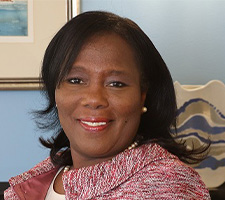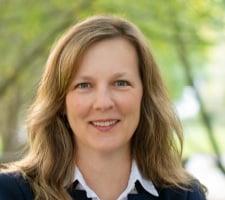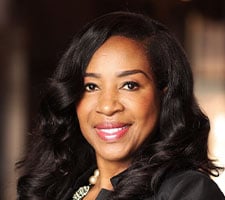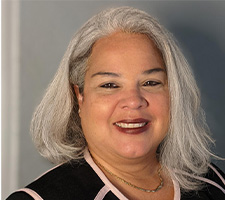Identifying and equipping diverse and qualified candidates for the presidency and other campus leadership positions is essential to the future of independent higher education. CIC provides a wide range of professional development opportunities—through conferences, workshops and seminars, consultations, and networking—for future leaders to learn from experts, share ideas, and support one another.
Several program alumni recently shared their views of four long-standing CIC leadership programs.

Presidential Vocation and Institutional Mission
The Presidential Vocation and Institutional Mission program, started in 2005, strengthens participants’ preparation for a meaningful and successful presidency by focusing on the alignment of institutional mission and personal vocation. A small cohort of senior administrators—along with their spouses or partners—comes together to think deeply about meaning, purpose, and institutional mission in the context of a college presidency. Signature elements of this yearlong program include reading of classic and contemporary texts, two discussion-based seminars, and ongoing consultations. As of this April, 201 senior administrators have completed one of eight programs for prospective presidents. Of these, about 35 percent have been appointed to a presidency. The program is generously funded by Lilly Endowment Inc.
What attracted you to the Presidential Vocation and Institutional Mission program? And what was the most meaningful component of the program to you?

Tracy Y. Espy, president of Mitchell College (CT), participated in CIC’s 2018–2019 Presidential Vocation and Institutional Mission program (and the 2013–2014 Executive Leadership Academy) when she was provost and vice president for academic affairs at Pfeiffer University (NC). Asked what drew her to the Vocation and Mission program she explained, “I was interested in developing my leadership potential. The program provided the platform to clarify my personal call with the mission of an institution. Further, the program was sensitive to the impact of a presidency on a spouse or partner—it offered development for my spouse as an important part of my presidential exploration.” Espy added that she most appreciated the opportunity to participate in small group sessions with other cohort members and to receive coaching from an experienced president and presidential spouse.

Steven Mason, president of LeTourneau University (TX), participated in the 2017–2018 program when he was provost and vice president for academic affairs at LeTourneau. “Since I began my career in academia, I have gained quite a bit from attending conferences, societies, and other professional development programs. For instance, when I became CAO here at LeTourneau, I attended CIC’s Workshop for New CAOs and found it valuable for my own development. In the case of the Presidential Vocation and Institutional Mission program, credit goes to my presidential predecessor, Dr. Dale Lunsford [now chancellor of LeTourneau], who offered to write a recommendation on my behalf. I felt honored that he would see fit to nominate me. When I read what the program entailed, I submitted my application with great interest…I knew it would be valuable for me and [my wife] Bonnie as we imagined what might be possible in the future.”
Mason added that “the relationships of colleagues and our mentors really undergirded the whole experience.” He said that the program helped him see “that for a presidency to last and to be effective, there must be strict alignment between an institution’s mission and our personal sense of vocation. In other words, the aspiration ‘just to be a president one day’ is not refined enough…and may be misguided altogether. The more thoughtful approach is to see if an opportunity arises whereby one is called to that institution through a sense of personal cohesion with its purposes.”
Since completing the program, what knowledge, skills, advice, or resources have you passed on to help others in the leadership pipeline?
“For starters,” Mason said, “I have recommended a range of CIC professional development resources to friends and colleagues. The readings and reflections shared through the program continue to shape my leadership and encouragement of others. For example, I teach an undergraduate leadership seminar in the Honors College at LeTourneau University every fall, and I use several of the texts we read in the CIC program as content for college students who may consider leadership opportunities in their own fields. Also, soon after the program, I wrote an essay for the LeTourneau University academic community about our institution’s own story (“saga”). I was so struck by the idea of the importance of understanding a particular college or university’s mission, vision, values, and overall story in considering leading it as president, that it moved me to dive deeply into the particular gifts and calling of LeTourneau University—for the benefit of any and all faculty and staff at the institution. It was the CIC program that formed my thinking about how important it is for any institution to understand its own vocation in order to clearly mark out strategic direction in the competitive landscape of higher education.”
Who within the program supported you on your professional development journey, and what did they do to guide you?
Espy highlighted the support she received from the program facilitators, including their guidance on preparing for the presidential interview and accepting her first offer.
Mason shared, “Our program facilitators were wonderful then and continue to be available to us. Outside of the program structure, we’ve enjoyed keeping up with others in our cohort, some of whom have also become university presidents. It is helpful to have people with whom to share the ups and downs of the role.”
What advice would you offer to those considering programs to move up the ladder?
“I would certainly encourage anyone interested in the presidency to consider this program,” Espy stated. “For participants to receive coaching from a seasoned president, and to be able to include a spouse or partner in the process, makes an excellent professional development opportunity.”
Mason added, “I would say to take full advantage of the programs, no matter what the future may hold. ‘Landing’ a presidency is not the ultimate measure of success for this particular program; better understanding who you are and what you might be called to, regardless, is the great takeaway.”
Executive and Senior Leadership Academies
CIC offers two Leadership Academies to extend and expand the leadership pipeline. The Executive Leadership Academy (ELA) is offered in partnership with both the American Academic Leadership Institute (AALI) and the American Association of State Colleges and Universities (AASCU). It prepares experienced provosts and vice presidents to move to positions of greater responsibility, including presidencies. The Senior Leadership Academy (SLA), offered in partnership with AALI, prepares mid-level administrators who aspire to cabinet-level positions. The ELA and SLA share proven and effective program features: annual cohorts developed through in-person seminars; experiential learning activities that take place throughout the year; a series of readings and case studies on key issues in higher education leadership; and mentorship and executive coaching by the Academy or campus senior leadership. Since 2009, 12 cohorts have participated in the Executive Leadership Academy, and since 2010, 12 cohorts have participated in the Senior Leadership Academy.
What made you seek out a professional development opportunity? And what drew you to the Executive or Senior Leadership Academy?

Kathryn A. Morris, president of St. Lawrence University (NY), participated in the 2019–2020 ELA when she was provost of Butler University (IN). “When I applied to the ELA, my main consideration was wanting to prepare myself for a presidency, in case that would be something I would want to pursue” she said. “I chose the CIC program because I had previously participated in CIC’s Workshop for Department and Division Chairs, Workshop for New CAOs, and Workshop for CAOs in Their Third or Fourth year—and I found all of these programs to be beneficial for discerning my professional goals and preparing for my next career steps.”

Chioma Ugochukwu, provost and senior vice president for academic affairs at Cabrini University (PA), whose ELA participation concludes this spring, remarked “As a provost, I recognized that the ELA would offer me the opportunity to not only grow and enhance my leadership skills, but also to discern if a presidency at some point in the future would be a good fit for me.”

Jeff Geldien, assistant vice president for advancement at Gonzaga University (WA), whose SLA participation concludes this spring, said, “I have been in higher education for 13 years and have found a home doing this work. But I realized that as I advance in my career, I would need to sharpen some of my leadership skillsets. Although I work in the advancement field, my work intersects with many other departments (such as finance, mission, academic affairs, student affairs, and athletics) and I wanted to learn how to better navigate the landscape we operate in.”

Rosa Rivera-Hainaj, provost of McDaniel College (MD), completed the 2018–2019 Senior Leadership Academy when she was assistant vice president for academic affairs at Our Lady of the Lake University (OLLU) (TX). She recounted that after she arrived at OLLU, the associate provost recommended the SLA to her, and the provost [Marcheta Evans, now president of Bloomfield College (NJ)] nominated her. “Previous professional development in which I had participated focused on leading others, but not much on my own professional growth. The focus on personal growth and network building drew me to the SLA.”
What was the most meaningful component of the program to you? In what ways did the experience impact your personal or professional goals?
Ugochukwu said, “Meeting senior administrators from other institutions and being part of a leadership cohort has been meaningful, particularly due to our shared experiences of navigating the pandemic. Sharing our experiences helped us tackle some of the issues we were confronting on our campuses. The most significant component of the ELA program for me, however, was that we were required to create a Professional Experience Plan. It made me look inward and identify skills I needed to boost, which meant that I had to put a plan in place for addressing those growth opportunities. Hearing from current and past presidents was also crucial because we were able to get a glimpse into ‘a day in the life’ of a president.”
Morris agreed: “The ELA program has two components that I found particularly useful. The first is having the opportunity to listen to current and former presidents talk about their experiences. The second is the professional connections among program attendees. Both proved invaluable to me.”
“The in-person meeting with my cohort was beneficial and rewarding,” Geldien said. “The chance to meet people and gain new perspectives about higher education has been most valuable thus far. I think in this line of work we can get really focused on our own day-to-day work and lose sight of the broader industry. The SLA program helped expand my view.”
“The most meaningful component of the SLA to me,” Rivera-Hainaj shared, “was the opportunity to take time to think about my own experiences and how I could use them to grow. The program provided me with opportunities for internal reflection and personal growth, as well as for applying my transferable skills and learning new ones.”
Since completing the program, what knowledge, skills, advice, or resources have you passed on to help others in the leadership pipeline?
Ugochukwu said that so far she has “passed on the importance of having a mentor; building CVs and cover letters that are more suited for presidential positions than faculty roles; using 990s and similar tools to gauge the financial strength of prospective institutions; learning as much as possible about different units on campus other than the one for which you have direct oversight; deepening your influence and impact; and leading from strength by having a clear understanding of one’s unique talents.”
“I have encouraged several colleagues to apply for the ELA and the SLA,” Morris said. “I also have encouraged people to consider which skills may be needed for their next professional role so they can consider ways to build those skills in the context of their current jobs.”
“The SLA experience was amazing, and I am still in contact with members of my cohort and leaders who presented to us,” Rivera-Hainaj stated. “Any opportunity I have to share what I learned at SLA with others, especially other women of color, I take. I see my role as a mentor to ensure that those who report to me are provided with the space and support to develop professionally.”
Geldien replied, “I have passed on the importance of understanding perspective. Every institution has its own set of challenges and opportunities…and I would suggest that participants be open-minded to learning new approaches that they might not be considering. A lot of institutions, specifically independent colleges and universities, have had to get really creative during the past few years to sustain operations. There are some extremely passionate and competent people in this program with some incredibly interesting ideas about new ways of doing business.”
Who within the program supported you on your professional development journey, and who outside the program structure has supported you on the journey?
“Linda Bleicken was very helpful to me,” Morris emphasized. “Not only was she a great resource during the program, but several years later when I found a presidency that truly piqued my interest (and that I now occupy), she provided excellent feedback on my application materials and was a good sounding board through the entire process. Outside the program structure, I am forever grateful and truly indebted to Butler University President James Danko, who supported me and my career development over our almost ten years of working together.”
Ugochukwu remarked, “I am grateful to have met several individuals who are part of my ELA cohort as well as others with whom I have formed friendships and whom I can reach out to in the future.”
Geldien added that in addition to the “tremendous” SLA staff, “the guest speakers were authentic and real, versus only sharing a ‘canned’ perspective. I also met several colleagues in my cohort who I know I will stay in touch with going forward, regardless of where our paths take us. My vice president also supported me in this journey.”
What advice would you offer to those considering programs to move up the ladder?
“Take advantage of this opportunity!” Ugochukwu said. “You will receive insights on a wide array of topics, including tips from representatives of search firms. You will learn more about yourself: Each session will provide opportunities for growth and help you decide if the timing is right for moving up the ladder and if it is even a good fit or what you genuinely want. If it is something you want, you will notice that receiving news that a member of your cohort has moved into a presidency will be inspiring and serve as a reminder that it could be you one day.”
Rivera-Hainaj advised others “to take on the opportunity to participate in programs like this. The relationships one can establish are priceless—it is like having your own cheer section and sounding board. The executive-level search process is complex and emotionally draining, and programs like the SLA provide not only tools but also a support community.”
In addition to gaining a new professional network to “bounce around ideas and share stories,” Geldien said that “the SLA is also good for helping participants discern whether a career in higher ed is for them or not. I would advise any potential participant to come into the program with an open mind and be willing to learn from others across the industry.”

Workshops for Department and Division Chairs
CIC’s annual series of professional development workshops for department and division chairs takes place in multiple cities across the country each spring. Sponsored by Academic Search, the workshops are led by experienced chief academic officers, department chairs, and attorneys specializing in higher education. In addition to general sessions, the program includes separate sessions for new and experienced chairs on topics such as understanding the department or division budget, using data effectively, building a collegial department, and becoming a campus leader.
What drew you to CIC’s Workshops for Department and Division Chairs? And what was the most meaningful component of the workshops to you?

Laura Lunsford, chair and professor of psychology at Campbell University (NC), completed a Workshop for Department and Division Chairs in 2019, after a mentor suggested she attend a leadership development opportunity as part of her new appointment as a department chair. “I had been in numerous leadership roles in public universities, but not in an academic role at a private university,” Lunsford said. “The chance to network with other chairs, both inside and outside of my area, was invaluable. I also truly valued the session presented by an attorney. It motivated me to return to my campus and straighten out our job descriptions!”

Sachiko Komagata, chair and associate professor of integrative health at Georgian Court University (NJ), participated in a 2021 workshop because the program was recommended by the school dean. “She solicited some chairs to attend the CIC workshop. I immediately volunteered,” said Komagata. “The most impactful session for me was led by Yolanda Page [vice president for academic affairs at Dillard University (LA)], who provided us with concrete examples of how we could positively impact students, including student outcomes. I returned to campus and initiated a conversation with our dean about D and F reports [reports of the rate of D and F grades in each course as a percentage of enrolled students] and how we could find the bottle-neck course that hindered students’ retention, graduation, and advancement to graduate programs. The reports helped us see things much more systematically than using anecdotes or students’ input alone.”
Since completing the workshop, what knowledge, skills, advice, or resources have you passed on to help others in the leadership pipeline?
“The legal guidance provided during the workshop made me pay more attention to our policies and to make sure all faculty members know them,” Lunsford said. “I have recommended this opportunity to other new department chairs.”
Komagata stated, “I am going to mentor a new chair as soon as this [spring] semester is over. I will empower him with the perspective that chairs can improve program outcomes significantly, and I will share information provided during the workshop.”
What advice would you offer to those considering programs to move up the ladder?
Lunsford advised that chairs “seek out an opportunity like this workshop—it gives you the time to reflect on your role as an academic leader and to think about how to support faculty members and student success. If you don’t have budget experience, then sit down with your chief financial officer to learn how to read budgets—it will save you a lot of frustration later. Also, find mentors who can be good sounding boards for your professional development and for handling challenges.”
Komagata provided words of advice and caution, “If you can enjoy uncertainty, continuous learning, and long dedicated hours to promote the health of the department as well as colleagues’ well-being, then you will enjoy being the chair. A chair’s duty is endless, and you will need to have good stamina and humility. If you are concerned about pay, do not become a chair, because you will spend millions more hours as a chair than as a regular faculty member.”


